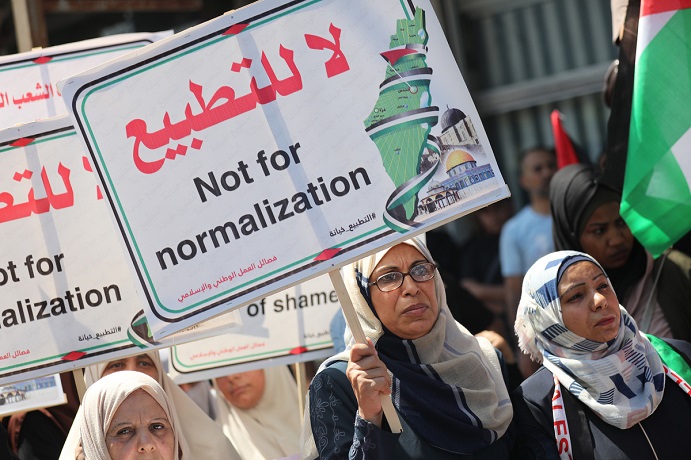
Yossi Melman
Middle East Eye / February 22, 2022
The Israelis are confident that an agreement to build a joint system with the UAE, Bahrain and even Saudi Arabia can be concluded, as they plan for a post-nuclear deal world.
As Iran, the US and the other five powers put the final touches to an agreement to reinstate the 2015 nuclear deal, Israel and its allies in the Arab world are preparing themselves for the day after.
Israeli diplomatic and security officials told Middle East Eye that they, together with their counterparts from the United Arab Emirates, Bahrain and Saudi Arabia, are engaged in talks to install a joint air defence program to protect them from the threat of drones.
The initiative is supported and encouraged by Washington, as a coordinated effort to tackle Iran and its proxies in the Middle East – above all Yemen’s Houthis.
In recent weeks, drone and rocket attacks on Abu Dhabi have been launched from areas under the Houthis’ control. The drones were manufactured in Iran and, according to intelligence officials in Israel and Abu Dhabi, the instructions were given by Tehran. Iran denies responsibility.
In the past, Saudi Arabia has also been exposed to damaging drone attacks, also launched from Yemen and, according to the US intelligence, from Iran. Over the past year, Houthi commanders have issued several threats that they may use their missiles and drones to strike Israel.
The southern port city of Eilat, which is located on the Gulf of Aqaba in the Red Sea, is situated 1,500 km from the Houthis’ territory. Israeli intelligence knows that the Houthi army does have long-range missiles which are indeed capable of reaching Eilat and its surroundings.
As a result of these threats, the Israeli military has occasionally deployed its famous Iron Dome air defence systems around Eilat. The Houthis, which control roughly half of Yemen including the capital, are supported by Iran’s Revolutionary Guard, which Israel believes supplies them with missiles, rockets, drones, intelligence equipment and training.
Israel already has three layers of air defences: Iron Dome, David’s Sling systems, which can intercept missiles up to 200km away, and Arrow batteries, which are capable of intercepting and downing long-range missiles at ranges of up to 2,000km – including ballistic missiles, which Iran has in its possession.
These systems have been developed and produced by Israeli military contractors as joint ventures with American security contractors. The cost is shared by both countries.
The three Israeli systems are integrated and assisted by advanced radars and other early warnings equipment. The air defences are also linked to a powerful American radar, stationed in the Negev/Naqab Desert in southern Israel.
Saudi Arabia, Bahrain and the UAE, meanwhile, are protected from missile and drone threats by US-made anti-missile defences, mainly the Patriot systems. But their performance so far has been less than satisfactory.
Rapidly growing ties
The secret talks about installing joint air defences are simply a more dramatic development in the rapidly growing security and military ties between Israel, the UAE, Bahrain and Saudi Arabia.
For more than a decade, the relations between these countries were secretive. Israeli military manufacturers sold them intelligence and homeland security equipment in deals that were partially facilitated by Mossad, Israel’s foreign espionage agency.
Israeli military experts trained staff in the Gulf states, and the heads of Mossad met frequently with their counterparts to exchange intelligence about common enemies and threats, such as militant terrorism and Iran’s efforts to increase its influence in Lebanon, Iraq, Syria, Yemen and the Gulf.
Things started to change as the Gulf felt the effects of the Trump administration’s tailwind. The UAE and Bahrain changed their policy, and agreed to take their Israeli ties out in the open. In August 2020 they announced they would be signing the Abraham Accords, and embassies were opened in Tel Aviv, Abu Dhabi, and Manama.
Saudi Arabia didn’t join the accords, but its relations with Israel, though not yet formal, are also developing very well, not only in the security field but also in general trade, aviation and tourism.
The diplomatic initiatives have been recently further accelerated by a series of visits and agreements.
Israeli Prime Minister Naftali Bennett visited Bahrain and UAE. His defence minister, Benny Gantz, also was in Manama, where he signed an unprecedented memorandum of understanding to pave the road to a future formal security cooperation agreement, the first of its kind between Israel and an Arab country.
And now comes the idea to develop and later deploy joint air defence systems, which will link Bahrain, UAE and Saudi Arabia with Israel. The program being discussed will create a unified control centre backed by radars and the various layers of Israeli-made anti-missile systems and equipment.
If all goes according to plan, it is possible that at a later stage Israeli Iron Dome and David’s Sling batteries will be deployed in the UAE, Bahrain and later in Saudi Arabia.
Israeli officials are optimistic about the proposed idea’s chances, and believe that if it materializes, it is not impossible that also Jordan and Egypt, which are also considered strategic allies of Israel, will join suit.
Yossi Melman is an Israeli security and intelligence commentator












